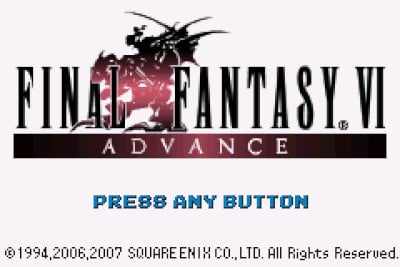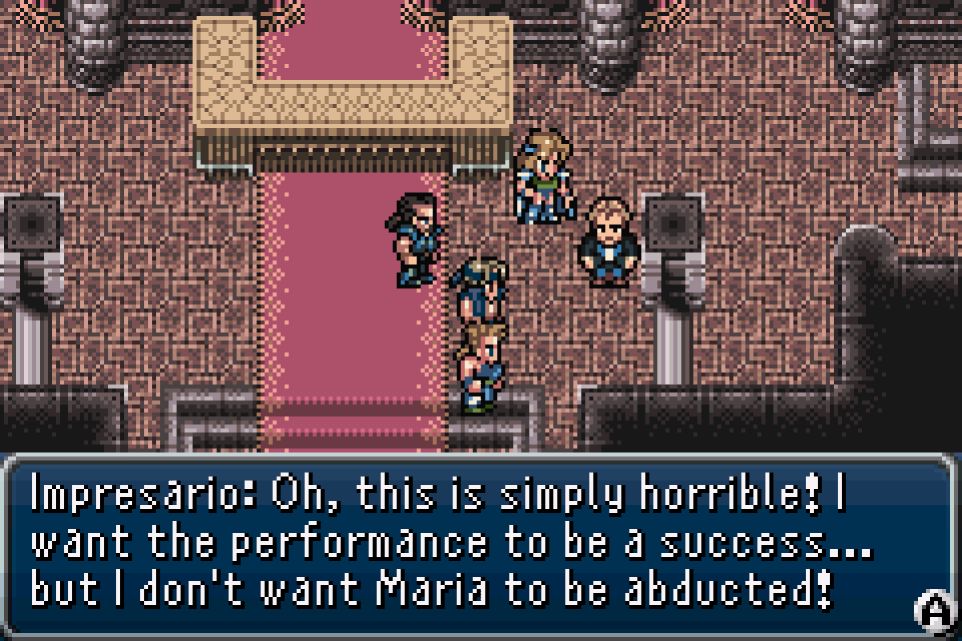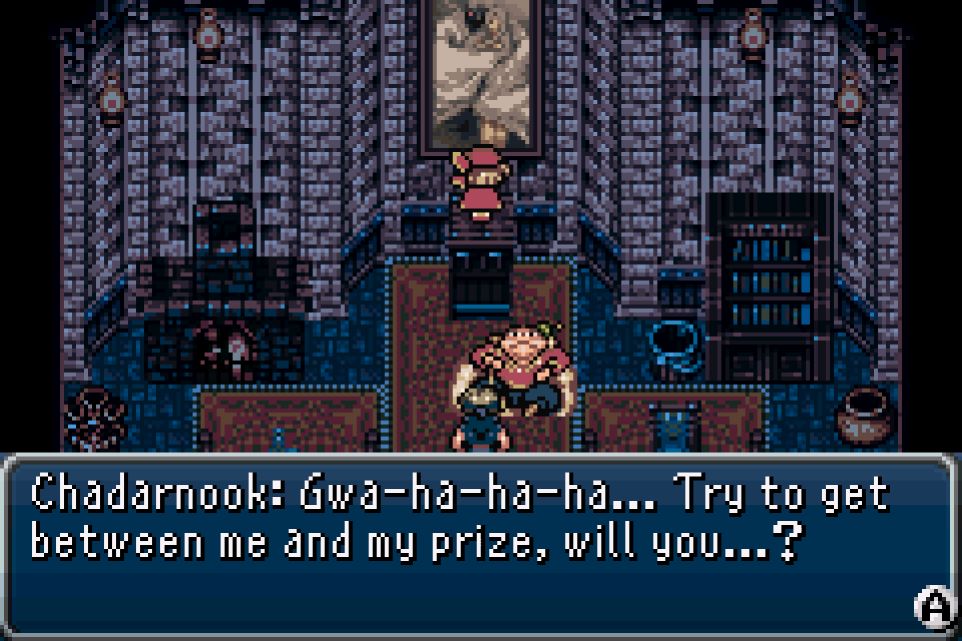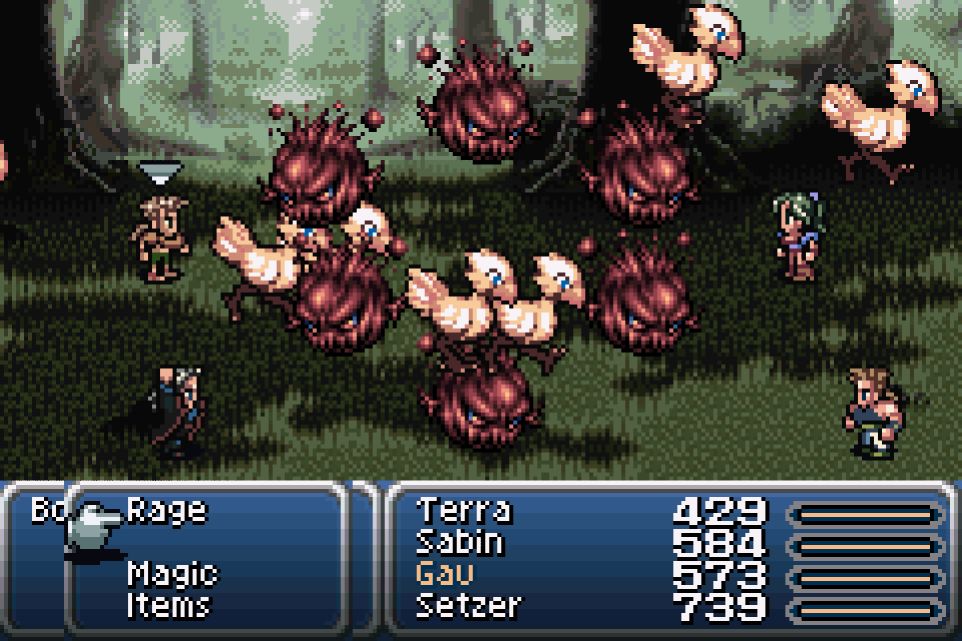
Final Fantasy VI Advance (Game Boy Advance) Review
Final Fantasy VI as a GBA Port…
~by tankMage (April 2025)
Score: 90/100 (Excellent)
I’ll keep this review brief, because just about everyone who is into Retro JRPGs has played or knows about FF6. I’ll also critique the aspects of it that are unique to the GBA port first, since Final Fantasy VI is widely accepted as an excellent game. I’ll also say this flat out: This port rides on the fact that Final Fantasy VI is a stellar game far more than it does its own merit.
When it comes to this port, there’s good news and bad news. The good news is it uses an excellent translation, fixes a lot of bugs from the original, and includes extra content. The bad news is the graphics didn’t translate well onto the GBA’s tiny screen, the music doesn’t have the same impact, and there’s extra content. Yeah, I mentioned the extra content twice, because I think it’s good in some ways and bad in others. I’ll get to that later.
Final Fantasy VI was not the best looking game on the SNES when it came out, but it was certainly the best looking Final Fantasy title up to that point. Sadly, the GBA’s 240p screen didn’t do the sprites and backgrounds any favors. It was pretty clear whoever was responsible for porting the graphical assets over to the GBA really struggled to cram everything into a screen that is roughly half the resolution of the original NTSC/PAL version. At the same time, the GBA’s screen is wider than the 4:3 aspect ratio used by old televisions. This resulted in a game that looks strange to anyone familiar with the SNES release. Portraits are smooshed and funny looking, backgrounds look grainy, and navigating dungeons that were designed with a specific field of vision in mind can be a clumsy affair.

Ironically, the GBA’s advanced technology and wider screen gave the devs a lot more room for text. While the aforementioned sprites and tiles suffered, there’s plenty of space for long descriptions as well as dialogue. I often found myself wishing the SNES version of FF6 had as much space for text, because it really enhanced the experience.
While Nobou Uematsu has been cited as saying FF7 is his favorite soundtrack out of those he composed, I argue that FF6 was his best work. Regardless, the soundtrack to this game is stellar, but the GBA version doesn’t hit quite the same. I have to give credit where credit is due by saying the overall job they did porting the music was good and some songs sound better, but the vast majority aren’t quite the same.
One thing the devs did extremely well with was the translation. The original FF6 was infamous for its rather poor translation that had been toned down for younger audiences. It also suffered from space limitations which plagued many RPGs at the time, which resulted in a rather garbled story. All of this is amended in Final Fantasy VI Advance and I was really happy to see the story truly come to life for the first time. If anything, this port is worth playing just for the translation, it’s that good.
Square also fixed a lot of the bugs that haunted the original. Commands like Sketch no longer add random items to the player’s inventory and the magic evade stat actually works. They also fixed a bunch of other bugs and rebalanced the game a bit.
This brings us to the bonus content, which I have conflicting feelings about. Square added secret bosses, new magic, new items, two new dungeons, and the ability to replay the final dungeon even after beating the game. For the most part, I enjoyed the new weapons, bosses, and spells. I also appreciated the ability to save the game after beating it. None of these additions were amazing, but they added some pizazz to an old favorite.

Then I got to the bonus dungeons. I didn’t hate the extra dungeons and I appreciated how the devs tried to fit them into the spirit of the game, but they just didn’t work for me. The first is a dungeon that requires three parties to complete. They tried hard to capture the spirit of dungeons from the first game in this dungeon, but I feel like they tried too hard to make it impressive. I found myself constantly switching parties as I tried to finish the dungeon and just got bored with it halfway through. I’ll be honest, I gave up on the first bonus dungeon out of boredom.
The second bonus dungeon was a very simple series of battles. While it wasn’t as inspired as the first dungeon, I enjoyed some of the challenges it presented and it didn’t annoy me like the first one did.
While I may not have been terribly impressed with either dungeon, I have to say they were far better than those that appeared in the GBA port of FF1…those dungeons really sucked. It’s also good that the devs tried to respect the spirit of FF6 and I think they did a good job of making extra content that didn’t clash with the SNES version.
Final Fantasy VI as a game…
I didn’t like RPGs when I was a kid. It wasn’t until I saw Final Fantasy VI in Nintendo Power Magazine that I was really interested in playing one. Something about FF6, though it was Final Fantasy III at the time, was enchanting. That summer I bought it with money I had saved up and was transported to a new world full of mystery, danger, and a sense of melancholy underscored by the determination of the heroes. I’ve played many RPGs since, but this one will always hold a special place in my heart.
With that being said, it’s difficult for me to judge this game objectively, but I’ll try and I’ll add that it was still a magical experience even thirty years later.
So, the story is fairly unique for an RPG in some ways and pretty standard in others. Magic vanished from the world long ago at the end of a catastrophic war. In the following centuries, humans developed technologies like steam engines and the world was more or less peaceful. Of course, peace never lasts (especially in RPGs) the Empire has somehow managed to revive magic and use it to conquer several cities, sparking a global war.
The player starts out as a mysterious woman with magical powers accompanied by two imperial soldiers and the game takes off from there. Players eventually recruit up to fourteen unique characters, each with their own special skills. Most of the characters have fairly well developed stories and personalities, with the exception of a few semi-secret ones.

The story and action flow very well, with the game sending players from place to place in a linear manner in the first half of the game. In the second half the world opens up for the player to explore freely, though it’s not exactly the same world as the one from the first act…
The battle system is largely in keeping with that used in nearly all of the first six games in the series. While this game isn’t particularly hard, there are a few tricky dungeons and bosses. What makes FF6 special, aside from its story, is its creative dungeons. Players will explore ghost trains, floating islands, and castles buried underground. Every dungeon is packed with treasures and many of them have gimmicks that make them more entertaining. Plus, some dungeons require more two or more parties working together to complete, which is a rare mechanic that I’ve only seen in a few games.
The heroes will also participate in battles where they are split into several parties who have to defend an objective, though these are rare and one of the less well realized aspects of the game. During these battles, the player merely has to fight a bunch of enemies without letting them get to their goal. The bad guys move slowly and aren’t really hard to deal with as long as you have a few potions. Despite being a bit mediocre, these battles work well with the story and act as a nice diversion from the usual gameplay loop.
As mentioned earlier, every character has special skills, with some being better than others. The only gripe I have about the way skills were designed is the fact that one character’s ability is pretty awful as the player has to sit and wait for it to charge up, wasting the turns of other party members in the process. Aside from that, the skill system is cool. One character can block spells, another can use special tools for a variety of effects, and (my favorite) can perform special attacks by inputting Street Fighter style button combos.
In addition to the skill system, players can customize their heroes to an extent using Espers and Relics. Espers teach the heroes spells and some of them even award stat bonuses if the character has one equipped upon leveling up, which gives players some control over the party’s attribute growth. Relics allow players to dual wield, jump like a dragoon, and improve various stats to name just a few of their powers. Each hero can only equip two Relics and some are very rare, so there’s some strategy involved in using them.
Going back to the structure of the adventure, the second half of the game is fairly open ended and full of secrets. Only the first few areas of it are linear, so there’s a lot of freedom to explore and experiment. Some areas are hidden as are some of the playable characters. In fact, some characters won’t be available in the second part of the game if the player makes the wrong decisions.
While the “open world” design of the second act is cool, it feels rather brief compared to the first act. Even the bonus dungeons added to the GBA version of FF6 do little to make the second act feel like it has enough content. That said, it could be my imagination playing tricks on me. It’s also better that the second act is brief, because I’d rather play a short, well designed game than one with tons of content that was just slapped together for the sake of making the game longer.
I mentioned the sound track in the first part of this review. It’s one of the best out of any RPG and a personal favorite. The original SNES soundtrack was superb, but the strength of the compositions holds up even on other systems.
So yeah, without belaboring the point, Final Fantasy VI is an excellent game all on its own.
Final Thoughts
I was really hoping FF6 Advance would be the definitive version of one of my favorite games, but it falls short of the mark due to technological limitations. However, it’s still a great port thanks to the bug fixes and translation. The bonus dungeons and extra Espers were also a nice touch. All in all, this is not a bad version of FF6 and it’s arguably closer to the original version of the game than the Pixel Remaster, which is good in its own right. At the end of the day, it’s not a bad idea to try this version of you are unsure about the SNES original and remaster.
Thanks for reading this review!
RetroMaggedon.com ©2025
